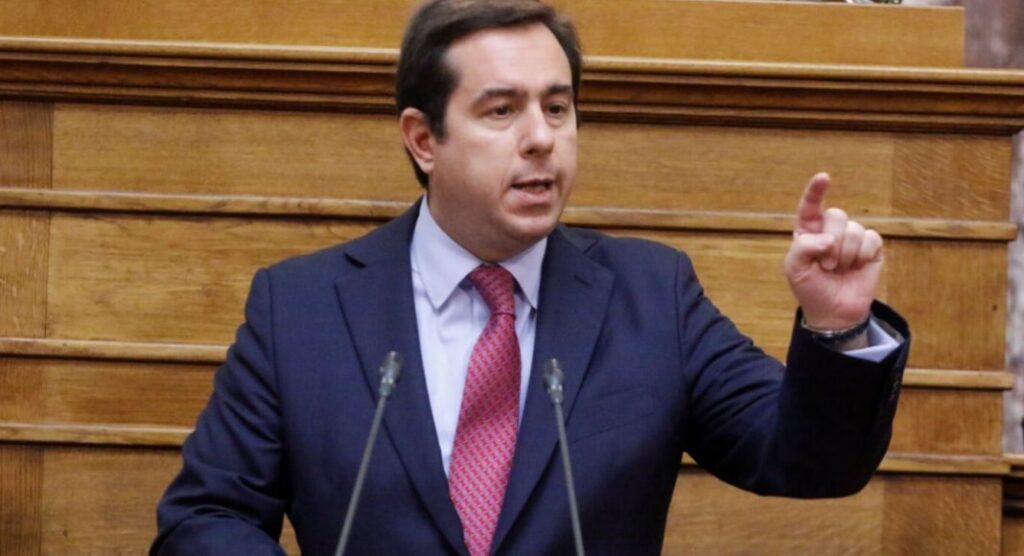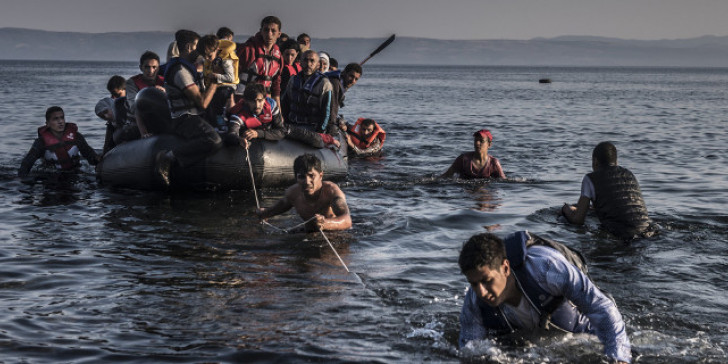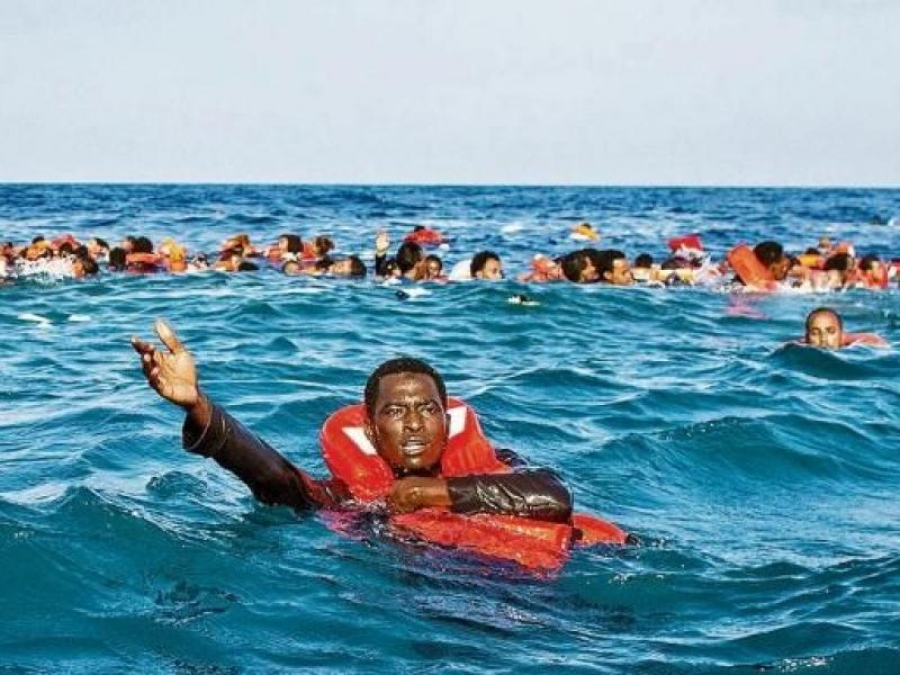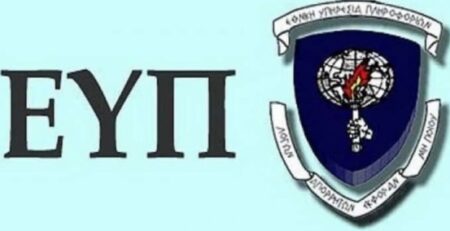Η Ελλάδα αρνείται κατηγορηματικά τους ισχυρισμούς των ΝΥΤ για τους μετανάστες
Προβοκατόρικο δημοσίευμα της αμερικανικής εφημερίδας σιγοντάρει την Άγκυρα
«Παρά τις προσπάθειες της Τουρκίας να εργαλειοποιήσει την μεταναστευτική κρίση, και παρά την πανδημία του κορονοϊού, συνεχίζουμε να παράσχουμε άσυλο σε όσους το δικαιούνται» , τονίζει ο Έλληνας υπουργός Μετανάστευσης και Ασύλου, Νότης Μηταράκης, σχολιάζοντας δημοσίευμα της εφημερίδας New York Times (ΝΥΤ). Ο Έλληνας υπουργός καθιστάτα σαφές : «Την ίδια στιγμή, θα συνεχίσουμε να προστατεύουμε σθεναρά τα σύνορα της Ευρωπαϊκής Ένωσης όπως προβλέπεται από την εθνική και ευρωπαϊκή νομοθεσία. Αρνούμαστε κατηγορηματικά ισχυρισμούς που διατυπώνονται για το αντίθετο».

«Η Ελλάδα εφαρμόζει μια αυστηρή αλλά δίκαιη μεταναστευτική πολιτική και σέβεται απολύτως τις υποχρεώσεις της που πηγάζουν από το διεθνές δίκαιο.
Το Λιμενικό Σώμα-Ελληνική Ακτοφυλακή έχει διασώσει, τα τελευταία χρόνια, δεκάδες χιλιάδες ζωές στο Αιγαίο Πέλαγος και χάρη στις προσπάθειες του, το 2020, είχαμε μόνο ένα θανατηφόρο συμβάν.
Παρά τις προσπάθειες της Τουρκίας να εργαλειοποιήσει την μεταναστευτική κρίση, και παρά την πανδημία του κορωνοϊού, συνεχίζουμε να παράσχουμε άσυλο σε όσους το δικαιούνται. Και σήμερα η χώρα μας φιλοξενεί 160 χιλιάδες πρόσφυγες και αιτούντες άσυλο.
Την ίδια στιγμή, θα συνεχίσουμε να προστατεύουμε σθεναρά τα σύνορα της Ευρωπαϊκής Ένωσης όπως προβλέπεται από την Εθνική και Ευρωπαϊκή νομοθεσία. Αρνούμαστε κατηγορηματικά ισχυρισμούς που διατυπώνονται για το αντίθετο. Σημειώνουμε ότι η Τουρκική Ακτοφυλακή αναφέρεται ως πηγή.
Συμπληρωματικά, επισημαίνουμε ότι από τις συνεντεύξεις που δημοσιεύονται από πρόσφυγες, οι οποίοι τώρα διαμένουν στην Τουρκία, δεν προκύπτουν στοιχεία ότι τα πρόσωπα αυτά διατρέχουν κίνδυνο στην Τουρκία και κατά συνέπεια δύνανται να αιτηθούν διεθνούς προστασίας εκεί.»
Το δημοσίευμα των ΝΥΤ

Στο δημοσίευμα των Patrick Kingsley and Karam Shoumali από τη Ρόδο με τίτλο “Taking Hard Line, Greece Turns Back Migrants by Abandoning Them at Sea” αναφέρεται:
“Πολλοί ΄Ελληνες έχουν ενοχληθεί με τους δεκάδες χιλιάδες αιτούντες άσυλο και τώρα ως φαίνεται “η νέα συντηρητική κυβέρνηση έχει μια νέα μέθοδο για να τους αποκλείσει”, αναφέρεται χαρακτηριστικά στον υπότιτλο του δημοσιεύματος.
Επισημαίνεται ότι από τον περασμένο Μάρτιο έλληνες αξιωματούχοι έριξαν στη θάλασσα τουλάχιστον 1.072 αιτούντες άσυλο, σε 31 ξεχωριστές επαναπροωθήσεις σύμφωνα με ανάλυση αποδεικτικού υλικού τριών ανεξάρτητων παρατηρητών, δύο πανεπιστημιακών ερευνητών και της τουρκικής ακτοφυλακής.

Πέραν της εξέτασης του προαναφερθέντος υλικού οι ΝΥΤ, πήραν συνέντευξη και από τους επιζήσαντες από 5 επαναπροωθήσεις ενώ εξέτασαν φωτογραφικό υλικό και βίντεο και από τις 31.
Πρόσφυγας από τη Σύρια κάνοντας λόγο για απάνθρωπη συμπεριφορά καταγγέλλει στους ΝΥΤ ότι έλληνες αξιωματούχοι συνέλαβαν την ίδια και άλλα 22 άτομα, μεταξύ των οποίων και δύο μωρά και, εκμεταλλευόμενοι το σκοτάδι, τους μετέφεραν από κέντρο κράτησης στη Ρόδο στις 26 Ιουλίου και τους εγκατέλειψαν σε σωστική λέμβο χωρίς κινητήρα ενώ στη συνέχεια διασώθηκαν από την τουρκική ακτοφυλακή.
Aπό την πλευρά της η ελληνική κυβέρνηση αρνείται οποιαδήποτε παραβίαση ενώ παρατίθενται δηλώσεις του έλληνα κυβερνητικού εκπρόσωπου κ. Στέλιου Πέτσα, σύμφωνα με τις οποίες οι ελληνικές αρχές δεν εμπλέκονται σε μυστικές δραστηριότητες και η Ελλάδα έχει αποδείξει ότι τηρεί το Διεθνές Δίκαιο, τις Συμβάσεις και τα πρωτόκολλα, το οποίο ισχύει και για τη στάση της έναντι προσφύγων και μεταναστών.
Από το 2015, κράτη όπως η Ελλάδα και η Ιταλία στηρίζονταν στην Τουρκία και τη Λιβύη για την ανάσχεση του προσφυγικού. Αυτό που άλλαξε τώρα, σύμφωνα με ερευνητές και παρατηρητές, είναι ότι η ελληνική κυβέρνηση πήρε την κατάσταση στα χέρια της. Aναφέρεται ότι οι μετανάστες αφήνονται σε τρύπιες λέμβους μεταξύ Τουρκίας και Ελλάδας ενώ σε άλλες περιπτώσεις έλληνες αποσυνδέουν τις μηχανές.
Αυτές οι επαναπροωθήσεις είναι εντελώς παράνομες, από κάθε άποψη Διεθνούς και Ευρωπαϊκού Δίκαιου, πρόκειται για ανθρωπιστική καταστροφή, αναφέρει ο καθηγητής Francois Crepeau, ειδικός σε θέματα διεθνούς δικαίου και πρώην εισηγητής του ΟΗΕ για θέματα δικαιωμάτων προσφύγων.Κάποτε οι Έλληνες συναισθάνονταν τα βάσανα των μεταναστών αλλά πολλοί πλέον έχουν ενοχληθεί και είναι εχθρικοί μετά από μια πενταετία κατά την οποία η Ελλάδα λαμβάνει περιορισμένη βοήθεια από την ΕΕ ενώ χιλιάδες αιτούντες άσυλο συνωστίζονται στα ελληνικά νησιά.
Μετά τις τελευταίες εκλογές, η νέα κυβέρνηση του Κυριάκου Μητσοτάκη έχει υιοθετήσει μια σαφώς σκληρότερη γραμμή έναντι των μεταναστών και προσφύγων από τη Σύρια. Η σκληρότερη αυτή γραμμή συνδέεται με τις εντάσεις στην Τουρκία η οποία ήδη έχει υποδεχθεί 3,6 εκατομμύρια πρόσφυγες από τη Συρία, περισσότερους από κάθε άλλο κράτος.Η Ελλάδα θεωρεί ότι η Τουρκία έχει προσπαθήσει να χρησιμοποιήσει τους μετανάστες για να αυξήσει την πίεση προς την ΕΕ προκειμένου να τη βοηθήσουν στη Συρία.
Αλλά αυτό έχει αυξήσει την πίεση στην Ελλάδα σε μια συγκυρία όπου τα δύο κράτη έχουν διαφωνίες για υδρογονάνθρακες στην ανατολική Μεσόγειο.
Στη συνέχεια το δημοσίευμα αναφέρεται στην προώθηση χιλιάδων μεταναστών από τις τουρκικές αρχές στα ελληνοτουρκικά σύνορα στα τέλη Φεβρουαρίου, που οδήγησαν στο πυροβολισμό τουλάχιστον ενός Σύρου πρόσφυγα και την άμεση παράτυπη εκδίωξη εκατοντάδων μεταναστών που έφτασαν στα σύνορα.
Επί σειρά ετών έλληνες αξιωματούχοι κατηγορούνταν για απωθήσεις και εκδιώξεις μεταναστών σε σποραδική βάση, συνήθως πριν να φτάσουν σε ελληνικό έδαφος. Σήμερα, και λόγω της πανδημίας, η στάση της Ελλάδας είναι σαφώς πιο συστηματική και συντονισμένη.
Εκατοντάδες μετανάστες έχουν στερηθεί ο δικαίωμα αίτησης ασύλου ακόμα και επί ελληνικού εδάφους και τους έχει απαγορευθεί η άσκηση ενδίκων μέσων κατά της εκδίωξης τους. Σύμφωνα με τον καθηγητή Francois Crepeau, η Ελλάδα εκμεταλλεύθηκε την συγκυρία του κορωνοϊού προκειμένου να κλείσει τα σύνορά της σε όποιον επιθυμεί.
Αναφέρεται επίσης ότι η Ελλάδα, ελλείψει κριτικής από πλευράς ΕΕ έχει σκληρύνει τη στάση της στην ανατολική Μεσόγειο τους τελευταίους μήνες. Μετανάστες που φτάνουν σε ελληνικά νησιά τοποθετούνται σε τρύπιες βάρκες, αφήνονται στη θάλασσα και στη συνέχεια διασώζονται από την τουρκική ακτοφυλακή.Αυτή η πρακτική δεν έχει προηγούμενο στην Ελλάδα, αναφέρει ερευνήτρια του Irish Center for Human Rights και μια από τις πρώτες που επεσήμανε το φαινόμενο, κάνοντας λόγο για ένα νέο, βίαιο τρόπο επαναπροώθησης που εφαρμόζεται σε πολλά νησιά του Αιγαίου.
Η Σύρια καταγγέλλει στους ΝΥΤ ότι τον Ιούλιο συνελήφθη από τις ελληνικές αρχές και κρατήθηκε σε αυτοσχέδιο κέντρο κράτησης στη Ρόδο αφού προηγουμένως παρέδωσε τα έγγραφα ταυτοποίησης της. Δημοσιογράφος των ΝΥΤ μπόρεσε να εντοπίσει την τοποθεσία του κέντρου κοντά στο λιμάνι χρησιμοποιώντας υλικό που μαγνητοσκοπήθηκε από δυο επιβάτες.
Σύμφωνα με δηλώσεις ακτοφύλακα και αξιωματούχου της Δημαρχίας η τοποθεσία εμπίπτει στη δικαιοδοσία του Λιμενικού, το οποίο ανήκει στην ελληνική ακτοφυλακή. Παλαιστίνιος πρόσφυγας επιβεβαιώνει την κατάθεση της Σύριας ενθυμούμενος ότι είχαν μιλήσει και ότι της είχε δώσει φάρμακα για την πίεση τα οποία της είχαν αρνηθεί οι Έλληνες αξιωματούχοι.
Στη συνέχεια αναφέρεται ότι κρατούμενοι αντί να οδηγηθούν σε εγκατάσταση άλλου νησιού και στη συνέχεια στην Αθήνα, όπως τους είχαν πει οι Έλληνες αξιωματούχοι, οδηγήθηκαν σε λέμβους οι οποίες αφέθηκαν στα θαλάσσια σύνορα με την Τουρκία όπου κινδύνευσε η ζωή τους ενώ τελικά διασώθηκαν από την τουρκική ακτοφυλακή.
Kαταγγελίες κάνει και ένας 24χρονος Παλαιστίνιος ο οποίος μεταξύ άλλων καταθέτει ότι οι ελληνικές αρχές στις ακτές της Σάμου τους μετέφεραν σε λέμβους οι οποίες ξεφούσκωσαν λόγω του βάρους ενώ βίντεο στο κινητό του δείχνει ότι λέμβοι που τελικά επιβιβάστηκαν ρυμουλκήθηκαν προς τα ανοικτά από ένα μεγάλο λευκό πλοίο. Υλικό της τουρκικής ακτοφυλακής δείχνει τις ίδιες λέμβους να διασώζονται από τούρκους αξιωματούχους αργότερα.
Αναφέρεται επίσης ότι οι ελληνικές αρχές αδρανοποιούν τις μηχανές των λέμβων και ότι σε δύο τουλάχιστον περιπτώσεις μετανάστες εγκαταλείφθηκαν στην ακατοίκητη νήσο Ciplak εντός τουρκικών υδάτων αντί να τοποθετηθούν σε λέμβους. Οι σχετικές μαρτυρίες επιβεβαιώνονται από την τουρκική ακτοφυλακή ενώ ΜΚΟ όπως η HRW ισχυρίζονται ότι μετανάστες που ζούν μόνιμα στην Ελλάδα εκδιώκονται μυστικά από τις ελληνικές αρχές, χωρίς τις νόμιμες διαδικασίες, μέσω του Έβρου.
H εποπτεύουσα τη μεταναστευτική πολιτική στην Ευρωπαϊκή Επιτροπή Ylva Johansson δηλώνει ότι ανησυχεί για τις κατηγορίες αυτές αλλά δεν έχει την αρμοδιότητα να τις ερευνήσει. “Δεν μπορούμε να προστατεύσουμε τα ευρωπαϊκά σύνορα παραβιάζοντας ευρωπαϊκές αξίες και ανθρώπινα δικαιώματα. Ο έλεγχος των συνόρων πρέπει να συμβαδίζει με το σεβασμό των θεμελιωδών δικαιωμάτων”, δηλώνει σε σχετικό ηλεκτρονικό της μήνυμα.
Το δημοσίευμα συνοδεύεται από φωτογραφικό υλικό που απεικονίζει σωστική λέμβο να προσεγγίζει τη Λέσβο, άφιξη μεταναστών στις ακτές της Λέσβου τον Φεβρουάριο, συμπλοκές μεταναστών και των ελληνικών αρχών στα ελληνοτουρκικά σύνορα το Μάρτιο, αυτοσχέδιο κέντρο κράτησης στη Ρόδο και διάσωση πρόσφυγα από τις τουρκικές αρχές (η παραχώρηση της φωτογραφίας έγινε από την τουρκική ακτοφυλακή)”.
*Διαβάστε εδώ όλο το ρεποτάζ όπως δημοσιεύτηκε στην εφημερίδα ΝΥΤ
Taking Hard Line, Greece Turns Back Migrants by Abandoning Them at Sea
Many Greeks have grown frustrated as tens of thousands of asylum seekers languished on Greek islands. Now, evidence shows, a new conservative government has a new method of keeping them out.

By Patrick Kingsley and
RHODES, Greece — The Greek government has secretly expelled more than 1,000 refugees from Europe’s borders in recent months, sailing many of them to the edge of Greek territorial waters and then abandoning them in inflatable and sometimes overburdened life rafts.
Since March, at least 1,072 asylum seekers have been dropped at sea by Greek officials in at least 31 separate expulsions, according to an analysis of evidence by The New York Times from three independent watchdogs, two academic researchers and the Turkish Coast Guard. The Times interviewed survivors from five of those episodes and reviewed photographic or video evidence from all 31.
“It was very inhumane,” said Najma al-Khatib, a 50-year-old Syrian teacher, who says masked Greek officials took her and 22 others, including two babies, under cover of darkness from a detention center on the island of Rhodes on July 26 and abandoned them in a rudderless, motorless life raft before they were rescued by the Turkish Coast Guard.
“I left Syria for fear of bombing — but when this happened, I wished I’d died under a bomb,” she told The Times.
The Greek government denied any illegality.
“Greek authorities do not engage in clandestine activities,’’ said a government spokesman, Stelios Petsas. “Greece has a proven track record when it comes to observing international law, conventions and protocols. This includes the treatment of refugees and migrants.”

Since 2015, European countries like Greece and Italy have mainly relied on proxies, like the Turkish and Libyan governments, to head off maritime migration. What is different now is that the Greek government is increasingly taking matters into its own hands, watchdog groups and researchers say.
For example, migrants have been forced onto sometimes leaky life rafts and left to drift at the border between Turkish and Greek waters, while others have been left to drift in their own boats after Greek officials disabled their engines.
“It is a human rights and humanitarian disaster,” Professor Crépeau added.
Greeks were once far more understanding of the plight of migrants. But many have grown frustrated and hostile after a half-decade in which other European countries offered Greece only modest assistance as tens of thousands of asylum seekers languished in squalid camps on overburdened Greek islands.
Since the election last year of a new conservative government under Prime Minister Kyriakos Mitsotakis, Greece has taken a far harder line against the migrants — often refugees from the war in Syria — who push off Turkish shores for Europe.
The harsher approach comes as tensions have mounted with Turkey, itself burdened with 3.6 million refugees from the Syrian war, far more than any other nation.
Greece believes that Turkey has tried to weaponize the migrants to increase pressure on Europe for aid and assistance in the Syrian War. But it has also added pressure on Greece at a time when the two nations and others spar over contested gas fields in the eastern Mediterranean.
For several days in late February and early March, the Turkish authorities openly bused thousands of migrants to the Greek land border in a bid to set off a confrontation, leading to the shooting of at least one Syrian refugee and the immediate extrajudicial expulsions of hundreds of migrants who made it to Greek territory.

For years, Greek officials have been accused of intercepting and expelling migrants, on a sporadic and infrequent basis, usually before the migrants manage to land their boats on Greek soil.
“They’ve seized the moment,” Professor Crépeau said of the Greeks. “The coronavirus has provided a window of opportunity to close national borders to whoever they’ve wanted.”
Emboldened by the lack of sustained criticism from the European Union, where the migration issue has roiled politics, Greece has hardened its approach in the eastern Mediterranean in recent months.
Migrants landing on the Greek islands from Turkey have frequently been forced onto sometimes leaky, inflatable life rafts, dropped at the boundary between Turkish and Greek waters, and left to drift until being spotted and rescued by the Turkish Coast Guard.
“This practice is totally unprecedented in Greece,” said Niamh Keady-Tabbal, a doctoral researcher at the Irish Center for Human Rights, and one of the first to document the phenomenon.
“Greek authorities are now weaponizing rescue equipment to illegally expel asylum seekers in a new, violent and highly visible pattern of pushbacks spanning several Aegean Islands,” Ms. Keady-Tabbal said.
Ms. al-Khatib, who recounted her ordeal for The Times, said she entered Turkey last November with her two sons, 14 and 12, fleeing the advance of the Syrian Army. Her husband, who had entered several weeks earlier, soon died of cancer, Ms. al-Khatib said.
With few prospects in Turkey, the family tried to reach Greece by boat three times this summer, failing once in May because their smuggler did not show up, and a second time in June after being intercepted in Greek waters and towed back to the Turkish sea border, she said.


On their third attempt, on July 23 at around 7 a.m., they landed on the Greek island of Rhodes, Ms. al-Khatib said, an account corroborated by four other passengers interviewed by The Times. They were detained by Greek police officers and taken to a small makeshift detention facility after handing over their identification documents.
Using footage filmed at this site by two passengers, a Times reporter was able to identify the facility’s location beside the island’s main ferry port and visit the camp.
A Coast Guard officer and an official at the island’s mayoralty both said the site falls under the jurisdiction of the Port Police, an arm of the Hellenic Coast Guard.
A Palestinian refugee, living in a disused slaughterhouse beside the camp, confirmed that Ms. al-Khatib had been there, recounting how he had spoken to her through the camp’s fence and bought her tablets to treat her hypertension, which Greek officials had refused to supply her.
Instead, masked Greek officials transferred them to two vessels that ferried them out to sea before dropping them on rafts at the Turkish maritime border, she and other survivors said.
Amid choppy waves, the group, which included two babies, was forced to drain the raft using their hands as water slopped over the side, they said.
The group was rescued at 4:30 a.m. by the Turkish Coast Guard, according to a report by the Coast Guard that included a photograph of Ms. al-Khatib as she left the life raft.
Ms. al-Khatib tried to reach Greece for a fourth time, on Aug. 6, but said her boat was stopped off the island of Lesbos by Greek officials, who removed its fuel and towed it back to Turkish waters.
Some groups of migrants have been transferred to the life rafts even before landing on Greek soil.


On May 13, Amjad Naim, a 24-year-old Palestinian law student, was among a group of 30 migrants intercepted by Greek officials as they approached the shores of Samos, a Greek island close to Turkey.
Videos captured by Mr. Naim on his phone show the two rafts being tugged across the sea by a large white vessel. Footage subsequently published by the Turkish Coast Guard shows the same two rafts being rescued by Turkish officials later in the day.
Migrants have also been left to drift in the boats they arrived on, after Greek officials disabled their engines, survivors and researchers say. And on at least two occasions, migrants have been abandoned on Ciplak, an uninhabited island within Turkish waters, instead of being placed on life rafts.
“Eventually the Turkish Coast Guard came to fetch us,” said one Palestinian survivor who was among a group abandoned on Ciplak in early July, and who sent videos of their time on the island. A report from the Turkish Coast Guard corroborated his account.
In parallel, several rights organizations, including Human Rights Watch, have documented how the Greek authorities have rounded up migrants living legally in Greece and secretly expelled them without legal recourse across the Evros River, which divides mainland Greece from Turkey.
Feras Fattouh, a 30-year-old Syrian X-ray technician, said he was arrested by the Greek police on July 24 in Igoumenitsa, a port in western Greece. Mr. Fattouh had been living legally in Greece since November 2019 with his wife and son, and showed The Times documents to prove it.
But after being detained by the police in Igoumenitsa, Mr. Fattouh said, he was robbed and driven about 400 miles east to the Turkish border, before being secretly put on a dinghy with 18 others and sent across the river to Turkey. His wife and son remain in Greece.


“Syrians are suffering in Turkey,” Mr. Fattouh said. “We’re suffering in Greece. Where are we supposed to go?”
Ylva Johansson, who oversees migration policy at the European Commission, the civil service for the European Union, said she was concerned by the accusations but had no power to investigate them.
“We cannot protect our European border by violating European values and by breaching people’s rights,” Ms. Johansson said in an email. “Border control can and must go hand in hand with respect for fundamental rights.”




